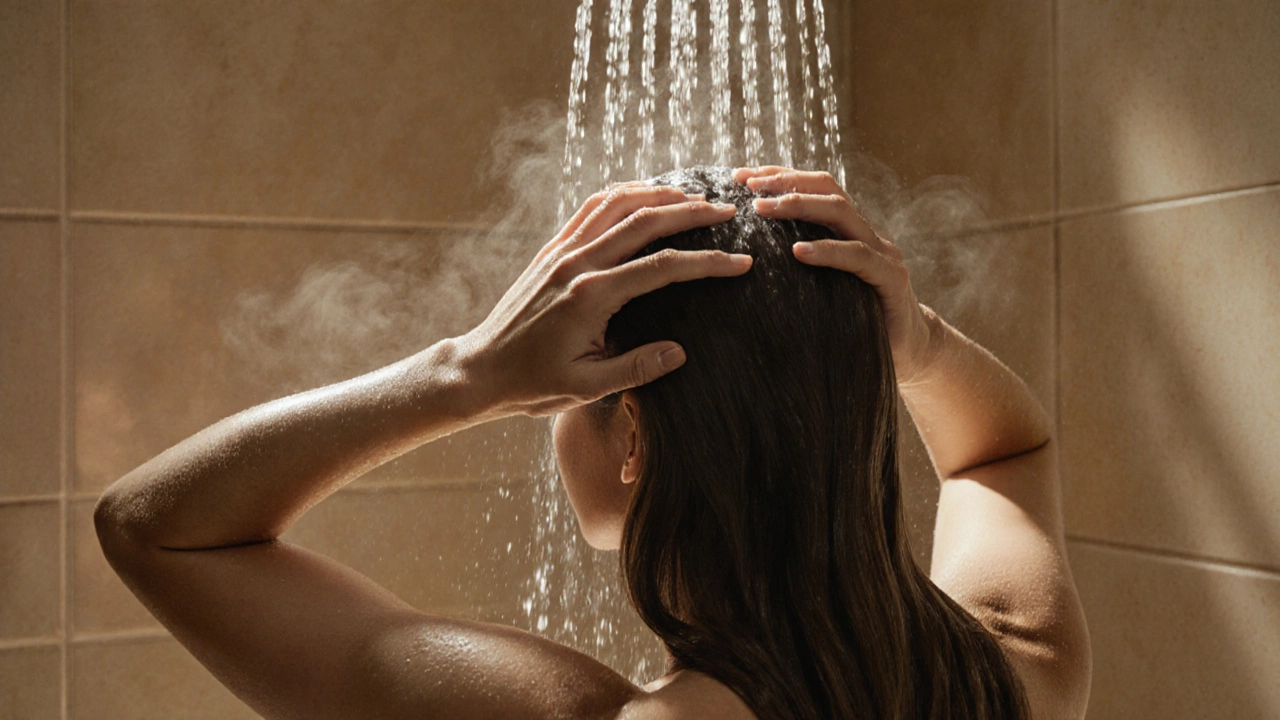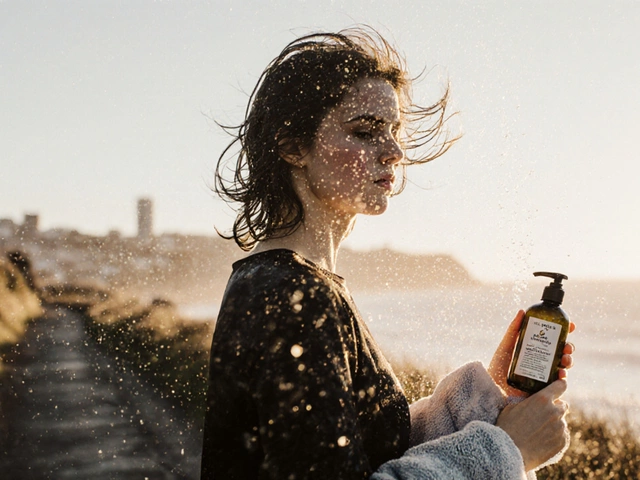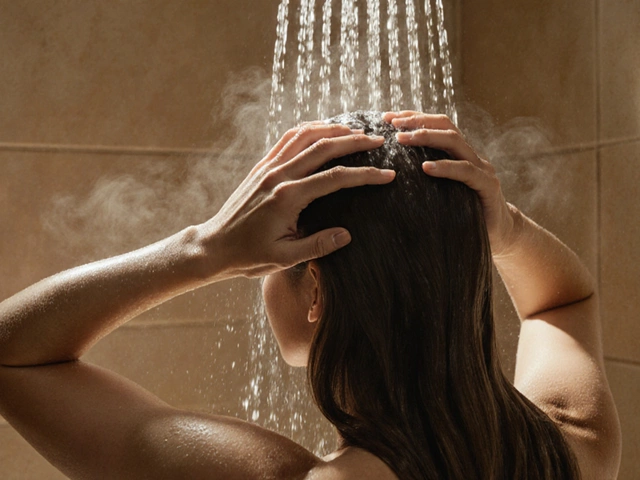Water-Only Hair Washing Suitability Calculator
Discover if water-only washing is right for you. Answer these questions to get personalized recommendations based on hair type, scalp condition, and your environment.
Your Water-Only Hair Washing Assessment
Recommended Approach
Tips for Success
Ever stared at your shampoo bottle and wondered if you really need it? You’re not alone. More people are skipping shampoo altogether and washing their hair with just water. Some swear it’s transformed their curls, others say it’s a disaster. So what’s the real deal? Can you actually wash your hair with just water-and should you?
What Happens When You Stop Using Shampoo
Your scalp produces sebum, a natural oil that protects your hair and skin. Shampoo strips that away, which is why your hair feels squeaky clean after washing. But that clean feeling? It’s actually your scalp being over-dried. When you stop using shampoo, your scalp doesn’t immediately adapt. In the first 1-3 weeks, you might notice greasy roots, flat hair, and even more buildup than before. This is your scalp overproducing oil to compensate for the stripping.After about 4-6 weeks, most people see a balance. Sebum production slows down. Your hair starts to feel less greasy between washes. Some report softer texture, less frizz, and reduced breakage. But this only happens if you’re consistent. Skipping shampoo isn’t a quick fix-it’s a reset.
Who Should Try Water-Only Hair Washing
Not everyone will thrive with just water. People with fine, straight hair often see the best results because their scalp oil travels easily down the strand. Curly or coily hair types can struggle-water alone doesn’t remove buildup from styling products, sweat, or hard water minerals. If you use a lot of gels, sprays, or oils, water won’t cut through them.People with scalp conditions like psoriasis or seborrheic dermatitis should be cautious. Water alone won’t reduce inflammation or flaking. In fact, it might make it worse. If you’re on medicated shampoos for dandruff, don’t stop without talking to a dermatologist.
Those who live in areas with soft water (like Wellington, where I am) have an easier time. Hard water leaves mineral deposits on hair, making it feel stiff and dull. If your tap water has high calcium or magnesium, water-only washing can leave your hair looking lifeless and brittle.
How to Wash Your Hair with Just Water
It’s not as simple as stepping into the shower and letting the water run. Here’s how to do it right:- Wet your hair thoroughly under lukewarm water. Hot water strips natural oils and irritates the scalp.
- Use your fingertips (not nails) to massage your scalp in circular motions for 2-3 minutes. This loosens oil and dead skin.
- Rinse for at least 1 full minute. Don’t rush it.
- For stubborn buildup, use a boar bristle brush to distribute natural oils and gently remove debris after washing.
- Let your hair air dry. Heat tools can dry out hair that’s already low in natural moisture.
Some people use a vinegar rinse (1 part apple cider vinegar to 4 parts water) once a week to clarify. It’s not shampoo, but it helps dissolve mineral buildup and restore pH balance. Others use baking soda paste occasionally-but don’t use it more than once a month. It’s too harsh for daily use.
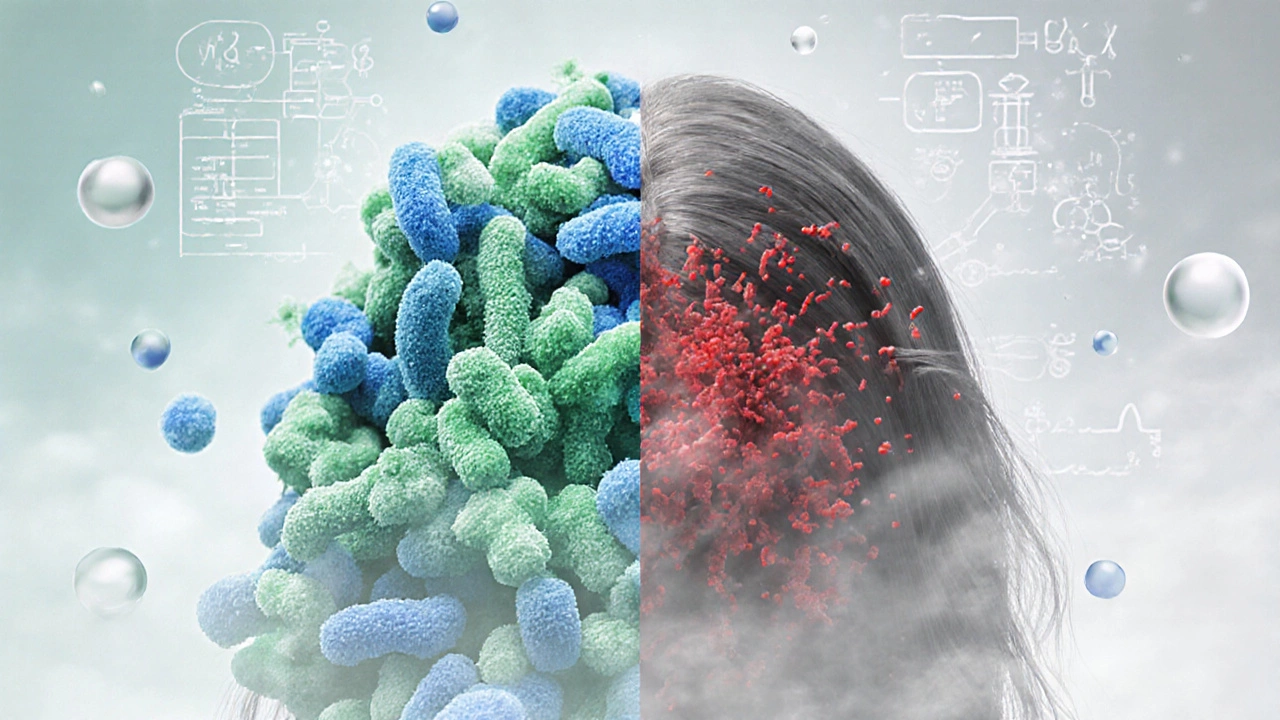
What Water Won’t Clean
Water is great at rinsing away sweat and light dirt. But it’s useless against:- Styling products (gels, mousses, sprays)
- Oil-based serums or leave-in conditioners
- Chlorine from pools
- Hard water minerals
- Environmental pollutants (smog, smoke, dust)
If you use any of these regularly, water-only washing will leave residue behind. That buildup can clog follicles, lead to itchiness, and even slow hair growth. You might think your hair is healthier-but it’s just coated.
The Science Behind Water-Only Hair Washing
There’s no large-scale clinical study proving water-only washing is better than shampoo. But dermatologists agree: frequent shampooing disrupts the scalp microbiome. A 2020 study in the Journal of Clinical and Aesthetic Dermatology found that people who washed their hair every other day had more diverse, balanced scalp bacteria than those who washed daily.The scalp microbiome plays a big role in hair health. Good bacteria keep harmful ones in check. Shampoos with sulfates and harsh detergents kill off both good and bad microbes. Water-only washing lets the good ones thrive.
That said, “no shampoo” doesn’t mean “no cleansing.” You’re still cleaning-you’re just doing it gently. Think of it like switching from soap to a gentle cleanser for your face.
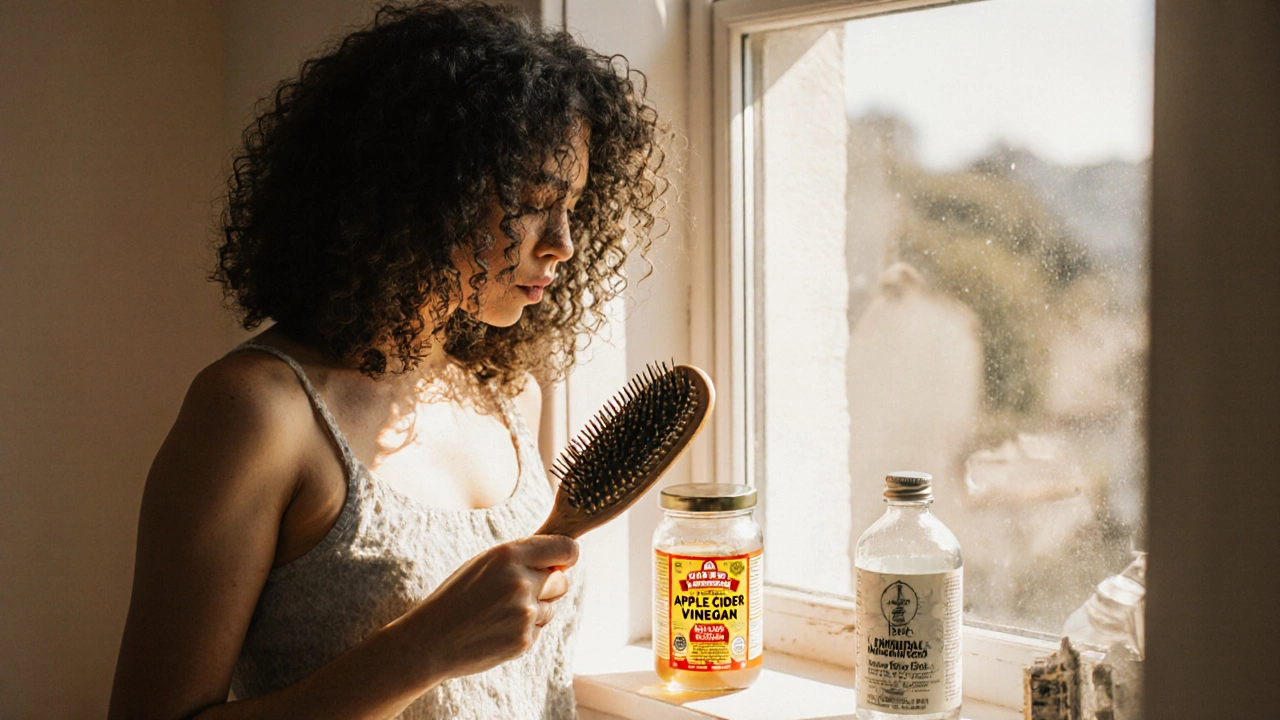
When Water-Only Washing Goes Wrong
It’s not all success stories. Some people hit a wall:- Hair feels greasy every day
- Scalp becomes itchy or flaky
- Hair looks dull or straw-like
- Odor develops, even after rinsing
If this happens after 8 weeks, water alone isn’t working for you. That doesn’t mean you failed-it means your hair and scalp need something else. Maybe you need a sulfate-free shampoo once a week. Or a clarifying rinse. Or a switch to a low-poo formula.
One woman in Auckland tried water-only for 6 months. Her hair got thicker, but her scalp developed a persistent odor. She went back to a gentle, fragrance-free shampoo and the smell vanished in two weeks. Sometimes, less shampoo isn’t better-it’s just different.
Alternatives to Shampoo
If water alone feels too extreme, here are gentler options:- Co-washing: Use a conditioner-only wash. Great for curly hair. Doesn’t strip oils but still removes buildup.
- Clay washes: Rhassoul or bentonite clay mixed with water. Draws out impurities without surfactants.
- Herbal rinses: Rosemary, nettle, or chamomile tea rinses. Soothe the scalp and add shine.
- Sulfate-free shampoos: Look for ones with decyl glucoside or coco-glucoside. Mild, plant-based cleansers.
Many people find a hybrid approach works best: water-only on weekdays, a gentle cleanser on weekends.
Final Verdict: Should You Try It?
Yes-if you’re willing to give it time and understand your hair type. If you have fine, oily hair and live in a soft water area, you might love it. If you have thick, curly, color-treated, or product-heavy hair, you’ll likely need something more.The goal isn’t to eliminate shampoo forever. It’s to find the least harsh routine that keeps your scalp healthy and your hair looking good. For some, that’s water-only. For others, it’s a mild shampoo twice a week. For most, it’s somewhere in between.
Try it for 6 weeks. Track how your hair feels, smells, and looks. Take photos. Don’t judge after 3 days. Let your scalp reset. And if it doesn’t work? That’s okay. Your hair isn’t broken. You just haven’t found your rhythm yet.
Can washing hair with just water make it grow faster?
No, water-only washing doesn’t directly speed up hair growth. Hair grows about half an inch per month, no matter what you use on it. But if water washing reduces breakage and scalp inflammation, your hair may appear longer because it’s not snapping off as easily. Healthy scalp = healthier hair retention.
How often should I wash my hair with just water?
Start by washing every 2-3 days. As your scalp adjusts, you can stretch it to every 4-5 days. Some people go a week or more. Listen to your scalp-if it’s itchy or oily, wash. If it feels fine, wait. There’s no rule-your hair, your schedule.
Will my hair smell bad if I don’t use shampoo?
Not if you rinse well and keep your scalp clean. Sweat and oil don’t smell on their own. Odor comes from bacteria breaking them down. If your hair smells, it’s likely due to buildup or hard water minerals. Try a weekly vinegar rinse or switch to a gentle cleanser once a week.
Can I wash my hair with just water if I have dandruff?
Not recommended. Dandruff is often caused by a yeast overgrowth or skin condition that needs specific treatment. Water alone won’t reduce flaking or itching. Use an anti-dandruff shampoo with zinc pyrithione or ketoconazole until symptoms clear, then consider reducing frequency.
Is it safe for kids to wash hair with just water?
Yes, and many parents do it successfully. Children’s scalps produce less oil, so they don’t need daily cleansing. Water-only washing works well for kids, especially if they’re active and sweat a lot. Just make sure to rinse thoroughly and avoid harsh water temperatures.
